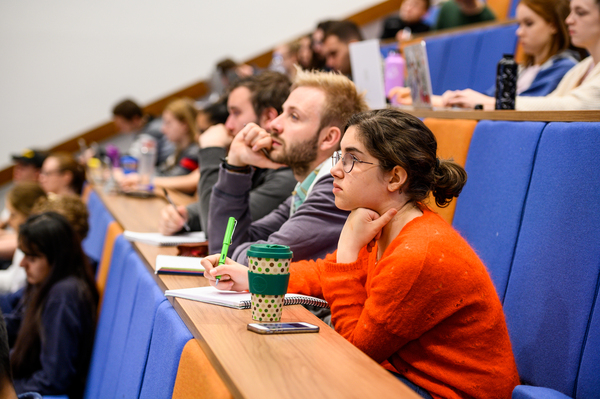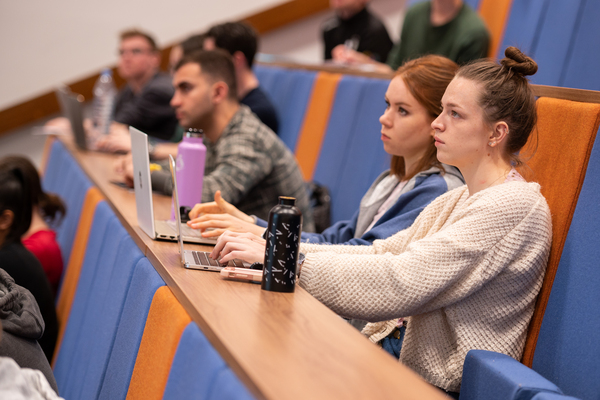View semester dates

BA (Hons) Politics
Immerse yourself in the events, issues and ideas that are shaping our world – and our future
Year of entry: 2026/27
View semester dates
Get to the very heart of political thinking and how conflicts and issues around the world affect us all.
Why choose Politics at York?
Explore the principles of power. You'll not only discover how power is won, but also how it's used to drive the decisions that influence our daily lives. You'll learn to think politically about some of today's most pressing issues, such as poverty, debt, conflict and environmental change.
Be supported by internationally-renowned experts. Our staff regularly contribute to news media and advise governments and institutions across the globe. Their research informs their teaching. You'll engage with the latest political thinking on current events and develop your own critical thinking in the process.
Study what you're passionate about. With a wide range of option modules available, this course is highly customisable. Covering the full breadth of the subject area, you'll be able to tailor your degree to focus on the areas of politics that interest you most.
Secure your future with career-building opportunities and employability support. Our in-house careers support will be available to you throughout your study. Weekly-drop ins and skills sessions give you the opportunity to develop your employability. You also have the option of adding a placement year or year abroad to your degree. This allows you to gain invaluable experience working or studying in another country before you graduate.
Course content
- Year 1 - six core modules
- Year 2 - two core modules and four option modules
- Year 3 - one core modules and four option modules, including a 40-credit dissertation
Learn how to think politically about some of today's most pressing issues, such as:
- The shifting balance of international power
- The challenges of human rights and global development
- Environmental sustainability
- Struggles for democracy
- The threat of terrorism
- The changing balance between government and civil society.
Year 1
Core modules
These modules will give you an understanding of the key concepts, theories and approaches in each major area of politics.
- Political Analysis
- Introduction to Comparative Politics
- Global Challenges: From Theory to Practice
- Introduction to Political Theory: States, Liberty and Revolution
- Introduction to Global Politics
- York Policy Lab
Applied Quantitative Analysis route
If you're interested in the statistical analysis of politics and international relations, you can transfer to an Applied Quantitative Analysis (AQA) route. You'll choose from a subset of option modules throughout your course, marked in the module lists here. If you do, you'll graduate with a degree title that recognises this specialism: BA Politics (Applied Quantitative Analysis).
Academic integrity module
In addition to the above you will also need to complete our online Academic Integrity module.
Year 2
In your second year, you will cover a diverse range of modules and hone the academic skills necessary to analyse political texts, political systems and processes.
Core modules
- Theories of the State (Semester One)
- Research Design (Semester Two)
Option modules
You will also study four option modules - two in Semester One and two in Semester Two. Examples can be found below. Some option module combinations may not be possible. The options available to you will be confirmed after you begin your course.
Semester One: 20 credit option modules
- Can Democracy Work?
- Capitalism: Beyond States and Markets
- Justice, Equality, and Difference
- European Union Politics
- Democracy, Autocracy and the State
- Human Rights and Wrongs
- The Rising Powers
- Critical Global Security Studies
Semester Two: 20 credit option modules
- Things Fall Apart: Political Thought in Times of Crisis
- The Politics of Gender
- Empire, War and Law
- Politics of Development
- Politics in the United Kingdom
- The US and Global Politics after the Cold War
- War and Peace
- Global Political Economy
The above list of options is indicative and subject to change. The exact options available to you will be confirmed in your first year. For further information please get in touch.
Elective modules
You may be able to replace one option module with an elective module, studying a complementary subject, a language or an interdisciplinary topic.
Year 3
In your final year you'll build on the knowledge you've gained over your degree. The year culminates in a dissertation: an extended essay based on your own research.
Core module
The dissertation is a chance for you to study a topic of your choice in depth. With the support of a supervisor, you'll identify a question and conduct independent research to find an answer. You will have the opportunity to learn and use quantitative and qualitative analytical techniques which are essential for modern social science research.
Option modules
You will also study four option modules. Examples can be found below. Some option module combinations may not be possible. The options available to you will be confirmed after you begin your course.
- Africa and International Politics
- Constitutional and Territorial Ideologies in Britain and Ireland
- India and its Neighbourhood
- Democracy and Emergency
- Development Paradigms
- Morality and Modern Warfare
- Gender, Violence and Resistance
- Global Governance: Purpose, Power and Performance
- Governmentality: Michel Foucault and the Analytics of Power
- Green Politics
- International Crisis Diplomacy
- Political Psychology and Public Opinion
- Politics of Peace after Civil War
- The Global Food System
- "We, the People": Ideas of Democratic Representation
- Britain in a Changing Global Economic Order
- Ethnicity and Conflict
- From War to Peace? Statebuilding and Political Transition in Southeast Asia
- Global Politics of Nuclear Weapons
- Global Sustainability and Energy Policy
- Karl Marx
- Politics of Technology: From the Luddites to the Unabomber
- Politics of the Middle East: Regimes and societies in transition
- Regionalism in World Politics
- Terrorism and Counter-terrorism
- The European Far Right
- The Labour Party and Socialism
- The Politics of (Post-)Colonialism
For those deciding to take the AQA route, you will study the following modules:
The options available to you will be confirmed later in the year. For further information please get in touch.
Elective modules
You may be able to replace one option module with an elective module, studying a complementary subject, a language or an interdisciplinary topic.
Our modules may change to reflect the latest academic thinking and expertise of our staff, and in line with Department/School academic planning.
Learning outcomes
Every course at York has been designed to provide clear and ambitious learning outcomes. These learning outcomes give you an understanding of what you will be able to do at the end of the course. We develop each course by designing modules that grow your abilities towards the learning outcomes and help you to explain what you can offer to employers. Find out more about our approach to teaching and learning.
Learning outcomes for this course
- Understand the origins, evolution and contemporary dynamics of politics.
- Apply theories, concepts and methods to aspects of politics, using critical reasoning and (where appropriate) empirical testing to evaluate their strengths and weaknesses.
- Research independently by: conceiving research questions; explaining the use of theories and concepts; selecting and applying appropriate tools to gather and interpret data; and justifying conclusions.
- Achieve goals by demonstrating initiative, self-organization, and time management in individual or collaborative work.
- Communicate effectively and fluently, translating advanced ideas through appropriate media and a range of formats.
- Demonstrate intercultural awareness and a reflective approach to differing visions of the public good in light of the values of tolerance and inclusivity.

The knowledge I gained at the University of York proved essential for my work in documentaries – particularly when working on the Channel 4 series ‘The Rise and Fall of Tony Blair’. People tend to assume I studied Media at university. Reading Politics has helped me to stand out.
YouTube Audience Development Strategist
Fees and funding
The fees and funding information here is for students starting in the 2026/27 academic year.
If you take a year abroad or year in industry you'll pay a reduced rate of fees for that year.
Annual tuition fees
| UK (home) | International and EU |
|---|---|
| £9,535 (TBC) | £26,900 |
The UK government has announced its intention to increase tuition fees from £9,535 to £9,790 for the 2026/27 academic year. We expect this to apply to new UK (home) undergraduate students starting their studies in September 2026.
UK (home) or international fees?
The level of fee that you will be asked to pay depends on whether you're classed as a UK (home) or international student. Check your fee status.
Fees for subsequent years
- UK (home) fees may increase within the government fee cap in subsequent academic years. We will notify you of any increase as soon as we can.
- International fees are subject to increase in subsequent years in line with the prevailing Consumer Price Index (CPI) inflation rate (up to a maximum of 10%).
More information
For more information about tuition fees, any reduced fees for study abroad and work placement years, scholarships, tuition fee loans, maintenance loans and living costs see undergraduate fees and funding.
Additional costs
Although students may decide to purchase some textbooks or other resources, we have an extensive physical and electronic library, so that there is no requirement to do so.
Funding
We'll confirm more funding opportunities for students joining us in 2026/27 throughout the year.
York, Oxford, Cambridge, Imperial
Just four UK universities are rated Gold for teaching and top ten for research* in the latest national assessment exercises.
* Awarded joint 10th in the Times Higher Education ranking of the Research Excellence Framework 2021.
Teaching and assessment
You’ll study and learn with academics who are active researchers, experts in their field and have a passion for their subjects. Our approach to teaching will provide you with the knowledge, opportunities, and support you need to grow and succeed in a global workplace. Find out more about our approach to teaching and learning.
Teaching format
In the Department of Politics and International Relations, you'll typically study three modules per semester. Each module you study has one lecture (1.5 hours) and one seminar (1 hour) every week. Our lectures introduce you to the latest debates, concepts and research in the field and stimulate your thinking. Our seminars take place in small groups. They give you a chance to deepen your understanding through interactive discussions and debates.
We also offer additional sessions to support you in your studies throughout the academic year. There are weekly assessment support drop-in sessions and regular study skills and writing workshops. You'll also have one-on-one meetings with your supervisor when completing your dissertation in your final year.
We also organise events to build a learning community between our students and staff. This includes weekly coffee mornings, an annual module choice fair, and collaborations with the university's Politics Society.
This still leaves time for independent study and learning that is the hallmark of a University education. In the UK, full-time students are expected to spend 1,200 hours a year learning. That's about 40 hours of classes and independent study each week during semesters. Everyone learns at a different rate, so the number of hours you spend on independent study will be different to other students on your course.
Research-led teaching
You'll be taught by academics at the forefront of research across a number of political areas such as conflict, security and development, political economy, international politics, political theory and public policy. As international experts in their field, our staff advise governments and organisations and regularly contribute to news and current affairs programmes. Our expertise and experience feed directly into our teaching.
Each module you study has a seminar and lecture every week. Our lectures introduce you to the latest debates, concepts and research in the field and stimulate your thinking. Our seminars take place in small groups and give you a chance to deepen your understanding of topics and engage in interactive discussion and debates. There are also opportunities for you to meet with our academics during their weekly feedback and guidance hours and to attend regular departmental events. This still leaves time for independent study and learning that is the hallmark of a University education.
In the UK, full-time students are expected to spend 1,200 hours a year learning. That's about 40 hours of classes and independent study each week during semesters. Everyone learns at a different rate, so the number of hours you spend on independent study will be different to other students on your course.
Teaching location
You will be based in the Department of Politics and International Relations on Campus West. Most teaching will take place nearby.
About our campus
Our beautiful green campus offers a student-friendly setting in which to live and study, within easy reach of the action in the city centre. It's easy to get around - everything is within walking or pedalling distance, or you can use the fast and frequent bus service. Take a campus tour.
Assessment and feedback
Assessment varies from module to module and includes a combination of exams, written essays and project work.
Your tutors will give you feedback in a variety of forms depending on the specific needs of the module. This may consist of written feedback, in-class discussion, model answers, one-to-one discussions or online responses.
You'll also meet with lecturers and seminars leaders outside the classroom during weekly feedback and guidance hours. Here you'll get personalised help, clarify course material, and get feedback on your ideas.
Careers and skills
Politics at York is ranked 9th in the UK for Graduate Prospects according to the Times Good University Guide, 2026. A York Politics degree is recognised by employers worldwide. You'll improve your employability with applied modules, opportunities to gain work experience, undertake internships or study abroad.
Many of our students organise work placements out of term time in an area that interests them. We encourage you to do this so you can gain workplace experience and get a deeper insight into issues that interest you. Previous students have spent the summer months interning at Ernst and Young, the Houses of Parliament and even the Mayor's Office in New York.
Career opportunities
Our recent graduates have gone on to work with:
- The Home Office
- The Cabinet Office
- The Department for Environment
- The European Parliament
- KPMG UK
- The World Food Programme
- Ernst & Young
- Goldman Sachs
Transferable skills
- Logical thinking
- Analysis of complex ideas, arguments and theories
- Problem-solving
- The ability to present succinct reports
- Intellectual independence
- Communication skills

In my whole heart I was like, ‘It’s York or nowhere guys!'
BBC Broadcaster
Entry requirements
| Qualification | Typical offer |
|---|---|
| A levels | AAB |
| Access to Higher Education Diploma | 36 credits at Distinction and 9 credits at Merit or higher |
| BTEC National Extended Diploma | DDD |
| European Baccalaureate | An overall average of 80% |
| International Baccalaureate | 35 points overall |
| T levels | Distinction overall including grade A in the Core T Level subjects in Accounting; Design and Development for Engineering and Manufacturing; Design, Surveying and Planning for Construction; Digital Business Services; Digital Production, Design and Development; Digital Support and Services; Engineering, Manufacturing, Processing and Control; Finance; Health; Healthcare Science; Legal Services; Maintenance, Installation and Repair for Engineering and Manufacturing; Management and Administration; Marketing; Science |
| Scottish Highers / Advanced Highers | Scottish Highers - AABBB Advanced Highers - not required for entry We may also be able to consider three Advanced Highers or a combination of Highers and Advanced Highers, where an applicant does not meet the grade requirement through Highers alone. Please contact us to discuss your qualifications. |
| International foundation programme | Foundation Certificate from our International Pathway College or an appropriate alternative. |
| Other international qualifications | Equivalent qualifications from your country |
Alternative offers
Meeting the following additional criteria may qualify you for an alternative offer.
| Criteria | Adjustment |
|---|---|
| Widening participation | BBC This is conditional upon successful completion of the WP programme including the YorJourney module (Black Access Programme, Next Step York) or successful completion of Realising Opportunities More about widening participation. |
| Contextual offer | BBB |
| EPQ | If you achieve C or higher in the EPQ, you may be eligible for an alternative offer up to one A level grade (or equivalent) below our typical offer. |
| Core Maths | If you achieve B or higher in Core Maths, you may be eligible for an alternative offer up to one A level grade (or equivalent) below our typical offer. |
| MOOCs | If you successfully complete our online course Power in crisis: Politics in the 21st Century, you may be eligible for an alternative offer up to one A level grade (or equivalent) below our typical offer. Details about how to evidence completion of the MOOC will be sent in your offer letter. Please note: you do not need to pay for the certificate. More about MOOCs. |
English language
If English isn't your first language you may need to provide evidence of your English language ability. We accept the following qualifications:
| Qualification | Minimum requirement |
|---|---|
| IELTS (Academic) | 6.5, with a minimum of 6.0 in each component |
| IB English | A score of 4 in English A or 5 in English B (Higher Level or Standard Level) |
| Cambridge CEFR | 176, with a minimum of 169 in each component |
| Oxford ELLT | 7, with a minimum of 6 in each component |
| Oxford Test of English Advanced | 136, with a minimum of 126 in each component |
| Duolingo | Integrated subscores: 120 overall, with a minimum of 105 in each component |
| GCSE/IGCSE/O level English Language (as a first or second language) | Grade C / Grade 4 |
| LanguageCert SELT | B2 with a minimum score of 33/50 in each component |
| LanguageCert Academic | B2 with a minimum score of 33/50 in each component |
| Kaplan Test of English Language | 478 Main Flight score with 444 in each component |
| Skills for English | B2: Merit overall, with Pass with Merit in each component |
| PTE Academic | 61, with a minimum of 55 in each component |
| TOEFL | 87 overall, with a minimum of 21 in each component (taken before January 2026) 4.5 with 5 in Listening and 4.5 in each other component (taken after January 2026) |
| Trinity ISE III | Merit in all components |
| Other English language qualifications | We also accept other English Language qualifications, including various school-leaving certificates. |
For more information see our undergraduate English language requirements.
If you haven't met our English language requirements
You may be eligible for one of our pre-sessional English language courses. These courses will provide you with the level of English needed to meet the conditions of your offer.
The length of course you need to take depends on your current English language test scores and how much you need to improve to reach our English language requirements.
After you've accepted your offer to study at York, we'll confirm which pre-sessional course you should apply to via You@York.
Next steps
Discover York









